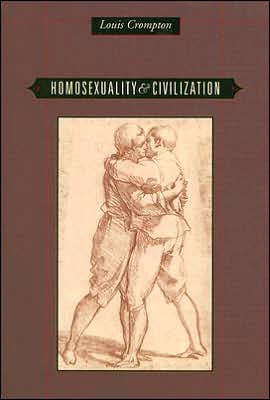Homosexuality and Civilization
How have major civilizations of the last two millennia treated people who were attracted to their own sex? In a narrative tour de force, Louis Crompton chronicles the lives and achievements of homosexual men and women alongside a darker history of persecution, as he compares the Christian West with the cultures of ancient Greece and Rome, Arab Spain, imperial China, and pre-Meiji Japan.\ Ancient Greek culture celebrated same-sex love in history, literature, and art, making high claims for its...
Search in google:
How have major civilizations of the last two millennia treated people who were attracted to their own sex? In a narrative tour de force, Louis Crompton chronicles the lives and achievements of homosexual men and women alongside a darker history of persecution, as he compares the Christian West with the cultures of ancient Greece and Rome, Arab Spain, imperial China, and pre-Meiji Japan.Ancient Greek culture celebrated same-sex love in history, literature, and art, making high claims for its moral influence. By contrast, Jewish religious leaders in the sixth century B.C.E. branded male homosexuality as a capital offense and, later, blamed it for the destruction of the biblical city of Sodom. When these two traditions collided in Christian Rome during the late empire, the tragic repercussions were felt throughout Europe and the New World.Louis Crompton traces Church-inspired mutilation, torture, and burning of "sodomites" in sixth-century Byzantium, medieval France, Renaissance Italy, and in Spain under the Inquisition. But Protestant authorities were equally committed to the execution of homosexuals in the Netherlands, Calvin's Geneva, and Georgian England. The root cause was religious superstition, abetted by political ambition and sheer greed. Yet from this cauldron of fears and desires, homoerotic themes surfaced in the art of the Renaissance masters—Donatello, Leonardo, Michelangelo, Sodoma, Cellini, and Caravaggio—often intertwined with Christian motifs. Homosexuality also flourished in the court intrigues of Henry III of France, Queen Christina of Sweden, James I and William III of England, Queen Anne, and Frederick the Great. Anti-homosexual atrocities committed in the West contrast starkly with the more tolerant traditions of pre-modern China and Japan, as revealed in poetry, fiction, and art and in the lives of emperors, shoguns, Buddhist priests, scholars, and actors. In the samurai tradition of Japan, Crompton makes clear, the celebration of same-sex love rivaled that of ancient Greece.Sweeping in scope, elegantly crafted, and lavishly illustrated, Homosexuality and Civilization is a stunning exploration of a rich and terrible past. Jeffrey Weeks - Times Higher Education Supplement Crompton's book is truly the culmination of a lifetime's commitment...Writing a history of homosexuality is therefore a mission to remind the reader of millennia of oppression and resistance. For Crompton, the commonalities of that disparate history of homosexuality lie in two elements: the fact of common sexual practices, and the possibilities of human love and devotion that survived and contested all that history ('their' history) could throw at it. His history is, in part at least, a history of celebration.
Preface1. Early Greece: 776-480 BCEA Millennium of Greek LoveHomer's IliadCrete, Sparta, ChalcisAthletics and the Cult of BeautySapphoAlcaeus, Ibycus, AnacreonTheognis of MegaraAthens' RulersThe Tyrannicides2. Judea: 900 BCE-600 CEThe Judgment of LeviticusThe Threat to PopulationSodom's GoldWho Were the Kedeshim?Philo of AlexandriaThe Talmud3. Classical Greece: 480-323 BCEPindar's OdesGreek TragedyPhidiasThe Comedies of Aristophanes Plato's SymposiumThe Phaedrus and the LawsXenophonAristotle's DictaZeno and the StoicsAeschines' Against TimarchusThe Sacred Band of ThebesPhilip and Alexander4. Rome and Greece: 200 BCE-138 CESexuality and EmpireCicero and Roman PoliticsGreek Love in the AeneidMeleager and CallimachusCatullus and TibullusTheocritus and "Corydon"HoraceOvid's MythsLesbianismPetronius' SatyriconSuetonius and the EmperorsStatius, Martial, JuvenalHadrian and Antinous5. Christians and Pagans: 1-565 CEThe GospelsIntertestamental Judaism and Paul"Moses" and the Early ChurchGreek Love in Late AntiquityPlutarch's Dialogue on LoveThe Lucianic DialogueTwo Romances and an EpicRoman Law before ConstantineThe Edicts of 342 and 390Sodom TransformedSaint John ChrysostomThe Persecutions of Justinian6. Darkness Descends: 476-1049The Fall of RomeVisigothic SpainChurch Councils and PenitentialsThe Carolingian PanicLove in Arab SpainThe Growth of Canon LawThe Book of Gomorrah7. The Medieval World: 1050-1321The Fortunes of GanymedeScandal in High PlacesThe Theological AssaultThe Inquisition and Its AlliesThe Fate of the TemplarsSecular Laws: The SowingThe Harvest BeginsPoets for the ProsecutionDante's Admirable Sinners8. Imperial China: 500 BCE-1840A Peach, a Fish, and a SleeveThe Han EmperorsTaoism, Confucianism, BuddhismPoets and LoversFrom Tang to SongMing China: The West ReactsFeng Menglong's Anatomy of LoveFiction and DramaThe Qing DynastyThe Peking Stage9. Italy in the Renaissance: 1321-1609A New Ethos and an OldRepression in the Italian City StatesDeath in VeniceFlorence: The Price of LoveDonatello, Botticelli, LeonardoMichelangelo: Love, Art, and GuiltSodoma and CelliniRome and Caravaggio10. Spain and the Inquisition: 1506-1700The Spanish InquisitionSubcultures in Valencia and MadridThe Inquisition in PortugalSpain and the New World11. France from Calvin to Louis XIV: 1517-1715Outings, Protestant and CatholicCalvinism and RepressionHenry III and the "Mignons"The Poets' Revolt 9. Queen ChristinaLouis XIII, "The Just"Monsieur and MadameSix GeneralsLes Lesbiennes12. England from the Reformation to William III: 1533-1702Silence and DenialMonasteries and the LawElizabethan LiteratureChristopher MarloweThe Tragedy of Edward IIShakespeare's SonnetsJames VI and IFrancis BaconPuritanism and the RestorationBetween WomenWilliam III in England13. Pre-Meiji Japan: 800-1868Europe Discovers JapanThe Buddhist PriesthoodSamurai and ShogunsNo Drama and KabukiA Debate and an AnthologySaikaku's Great MirrorTokugawa Finale14. Patterns of Persecution: 1700-1730Policing Paris"Reforming" BritainSouls in ExileWitch Hunt in the Netherlands15. Sapphic Lovers: 1700-1793Law and ReligionRomance and InnuendoA Nun and an ActressAn Ill-Fated Queen16. The Enlightenment: 1730-1810Montesquieu and BeccariaFrederick the GreatThe Vagaries of VoltaireDiderot and SadeToward ReformBentham vs. BlackstoneConclusionNotesBibliographyAcknowledgmentsIllustration CreditsIndex
\ ChoiceBased on the best recent scholarship and providing an overview of homosexuality from the Greeks to the end of the 18th century, this levelheaded, easy-to-read volume confirms the fact that homosexuality has had a long history (with periods of greater or less tolerance)… The result is the best historical overview of the topic that this reviewer has read.\ — V. L. Bullough\ \ \ \ \ \ Los Angeles TimesBrilliantly researched… Crompton, drawing on his immense erudition, contrasts Christianity and its barbaric cruelty toward same-sex love with more benign traditions in Moorish Spain… [He] also discusses the cult of romantic homosexuality in traditional Japan, where relationships of intense loyalty and idealism sprang up between the samurai and their pages.\ — Edmund White\ \ \ \ Louisville LetterAt last, a comprehensive, scholarly investigation into homosexuality through the ages. In Homosexuality and Civilization, Louis Crompton discusses in elevated but readable fashion how gays and lesbians have affected the civilized world from ancient Greece to modern America, and been affected by it.\ \ \ \ \ \ New York TimesIn Louis Crompton's sober, searching and somber new history, Homosexuality and Civilization, homosexuality is associated with the inner workings of civilization itself… It begins in the gladness of early Greece, where homosexuality had an 'honored place' for more than a millennium, and concludes with the madness of 19th-century Europe. In between is what Mr. Crompton calls a 'kaleidoscope of horrors' lasting more than 1,500 years… This is a restrained, careful, clear book of scholarly exposition.\ — Edward Rothstein\ \ \ \ \ \ ReasonEven after the explosion of literature on gay issues since the 1970s, comprehensive examinations of homosexuality in history have been few. An exception is Louis Crompton's new Homosexuality and Civilization, a sweeping account that was 18 years in the making. Crompton, a professor emeritus of English at the University of Nebraska, presents both a catalog of horrific abuse and persecution in the West and a surprising history of tolerance in some Eastern cultures, such as Japan, where homosexuality was 'an honored way of life among the country's religious and military leaders.'\ — Julian Sanchez\ \ \ \ \ \ Taipei TimesWhen Europeans first arrived in the Americas they found men engaged in erotic entanglements virtually on the quayside. They responded with the horror their religion had implanted in them, holding out their bibles and shouting 'Abomination! Devilry! Witchcraft!' The problem was they found the same thing almost everywhere they set foot in East Asia. China and Japan both looked on this kind of activity with a cool shrug of the shoulders. But as the Europeans' colonizing push gathered force, the hangings, disembowelment by mastiffs and burnings alive (especially popular) began to appear in these regions as well… This is a major work… It will be the first book future researchers in the topic turn to, and what they will find is a magisterial survey that delivers the fruits of a lifetime's study. Everything in the field is touched on and weighed in the balance.\ — Bradley Winterton\ \ \ \ \ \ Times Higher Education SupplementCrompton's book is truly the culmination of a lifetime's commitment… Writing a history of homosexuality is therefore a mission to remind the reader of millennia of oppression and resistance. For Crompton, the commonalities of that disparate history of homosexuality lie in two elements: the fact of common sexual practices, and the possibilities of human love and devotion that survived and contested all that history ('their' history) could throw at it. His history is, in part at least, a history of celebration.\ — Jeffrey Weeks\ \ \ \ \ \ Toronto StarBeginning where one would suspect—the ancient Greeks—Crompton puts a particular emphasis on Eastern social history in pursuing his narrative of the evolving place of homosexuality all the way to the Enlightenment. A key Crompton theme is that while much of Western civilization officially persecuted homosexuals throughout the ages, whatever the hypocrisy involved, in many Eastern cultures—including pre-modern China and samurai Japan—'the celebration of same-sex love rivaled that of ancient Greece.'\ \ \


